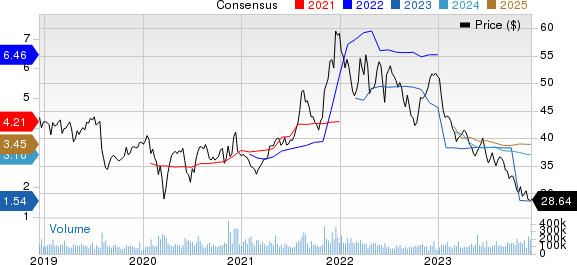Pfizer's (PFE) Hemophilia Candidate BLA Gets FDA Acceptance
Pfizer PFE announced that the FDA has accepted its biologics license application (BLA) seeking approval of its anti-TFPI inhibitor, marstacimab, for the treatment of hemophilia A and B. The FDA has granted the BLA a standard review, with a decision expected in the fourth quarter of 2024.
The European Medicines Agency (EMA) has also validated the marketing authorization application (MAA) for marstacimab. The European Commission’s decision on the MAA is expected by the first quarter of 2025
Pfizer has developed marstacimab as a prophylactic treatment to prevent or reduce the frequency of bleeding episodes in individuals with hemophilia A or hemophilia B with or without inhibitors.
Year to date, the stock has plunged 44.2% against the industry’s 4.3% rise.

Image Source: Zacks Investment Research
The regulatory submissions were based on positive data from the phase III BASIS study, which evaluated marstacimab as a treatment for hemophilia A or B patients, without inhibitors to Factor VIII (“FVIII”) or Factor IX (“FIX”).
Data from the study showed that participants treated with marstacimab achieved a statistically significant and clinically relevant reduction in annualized bleeding rate (“ABR”) compared with the current standard-of-care treatment for hemophilia patients during a 12-month period.
A rare genetic blood disorder, hemophilia is caused by a missing clotting protein (FVIII in case of hemophilia A and FIX in case of hemophilia B), which prevents normal blood clotting. If blood does not clot properly, it can lead to painful bleeding inside the joints that can cause scarring and damage.
The most common treatment for hemophilia A and B is factor replacement therapy, which replaces missing clotting factors to facilitate proper blood coagulation. Marstacimab targets TFPI, which is a natural anticoagulation protein that functions to prevent the formation of blood clots. Marstacimab, though its novel mechanism of inhibiting TFPI, restores hemostasis (
cessation of bleeding). Its once-weekly, subcutaneous flat-dose administration will also potentially prevent life-threatening bleeds
Like marstacimab, Novo Nordisk NVO also developed its own anti-TFPI inhibitor, concizumab, for treating hemophilia A and B with inhibitors. In mid-2023, Novo Nordisk received a complete response letter (“CRL”) from the FDA on the regulatory filing for concizumab in hemophilia A or B patients. Per the CRL, the agency requested additional data from Novo Nordisk on the drug’s administration and manufacturing process. In September, concizumab was approved in Japan by the name of Alhemo for the treatment of hemophilia A and B with inhibitors.
Other than marstacimab, Pfizer has developed two other investigational gene therapies for hemophilia patients — fidanacogene elaparvovec (for hemophilia B) and giroctocogene fitelparvovec (for hemophilia A). Regulatory applications seeking approval of fidanacogene elaparvovec are under review in the United States, with a decision expected in the second quarter of 2024. A regulatory filing is also under review in the EU. Giroctocogene fitelparvovec is being evaluated in a late-stage study.
Several companies have developed their gene therapies for the hemophilia indication.
In November 2022, the FDA approved Hemgenix, a gene therapy for treating hemophilia B in adults aged 18 years and older. This gene therapy has been developed by uniQure QURE in partnership with CSL Behring, the latter being a subsidiary of CSL Limited. Following approval, uniQure/CSL’s Hemgenix became the first FDA-approved gene therapy for treating hemophilia B. Hemgenix was launched in the United States in July 2023. The clinical development program for Hemgenix was initially led by uniQure, which was subsequently transferred to CSL after it acquired global rights to commercialize the treatment.
BioMarin Pharmaceuticals’ BMRN Roctavian (valoctocogene roxaparvovec or valrox), a gene therapy for severe hemophilia A, was approved by the FDA in June 2023, after a series of delays and rejections. Roctavian was approved in the European Union in August 2022. BioMarin’s Roctavian has been designed to deliver a functional gene that enables the body to produce the FVIII protein on its own, reducing the need for ongoing prophylaxis.
Zacks Rank
Currently, Pfizer has a Zacks Rank #3 (Hold). You can see the complete list of today’s Zacks #1 Rank (Strong Buy) stocks here.
Pfizer Inc. Price and Consensus

Pfizer Inc. price-consensus-chart | Pfizer Inc. Quote
Want the latest recommendations from Zacks Investment Research? Today, you can download 7 Best Stocks for the Next 30 Days. Click to get this free report
Pfizer Inc. (PFE) : Free Stock Analysis Report
BioMarin Pharmaceutical Inc. (BMRN) : Free Stock Analysis Report
Novo Nordisk A/S (NVO) : Free Stock Analysis Report
uniQure N.V. (QURE) : Free Stock Analysis Report

 Yahoo Finance
Yahoo Finance 